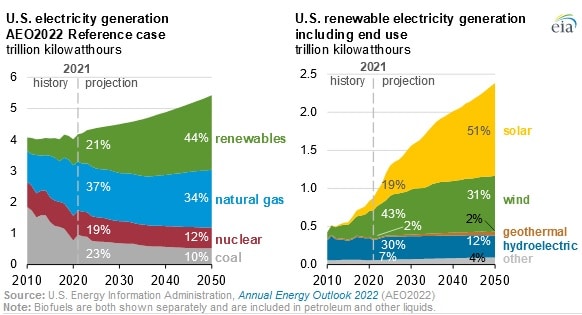U.S. Renewable Generation Capacity to More Than Double in 2050: EIA

U.S. power generation from renewables will expand from 21 percent in 2021 to 44 percent in 2050, according to a March 18 report from the U.S. Energy Information Administration. The growth in renewable energy can be attributed to a rise in new wind and solar power generation assets. Growth in wind and solar assets is projected to be driven by federal tax credits set to expire or significantly decline by 2026 and declining technology costs for both. Meanwhile, the share of coal and nuclear in the U.S. power generation mix is projected to decline.
The impact of hydropower continues to be stable through 2050, and other renewable sources of power production, such as geothermal and biomass, altogether stay on less than 3% of total generation. The agency, in its outlook, projects that the provision of total solar generation, including both commercial solar farms and small scale rooftop end use systems, will exceed wind generation by the early 2030s.
The agency projects that the total share of U.S. fossil fuel fired power production will decrease from 60 percent to 44 percent in 2050, in line with the sustained phase out of coal generators and sluggish expansion in natural gas fired production. Generation from renewable sources are expected to offset the lower coal and nuclear shares, due to existing regulatory programs and market factors incentivising renewable sources. Natural gas generation is expected to increase in absolute terms, however the percentage of natural gas in the total electricity production mix declines marginally from 37 percent in 2021 to 34 percent in 2050.
Energy storage systems, such as stand alone batteries and solar battery hybrid systems are expected to increase in the upcoming years. Energy storage assets compete with gas fired generators to provide electricity generation and supply back up capacity for periods when renewable energy sources are unavailable.
EnerKnol Pulses like this one are powered by the EnerKnol Platform—the first comprehensive database for real-time energy policy tracking. Sign up for a free trial below for access to key regulatory data and deep industry insights across the energy spectrum.
ACCESS FREE TRIAL